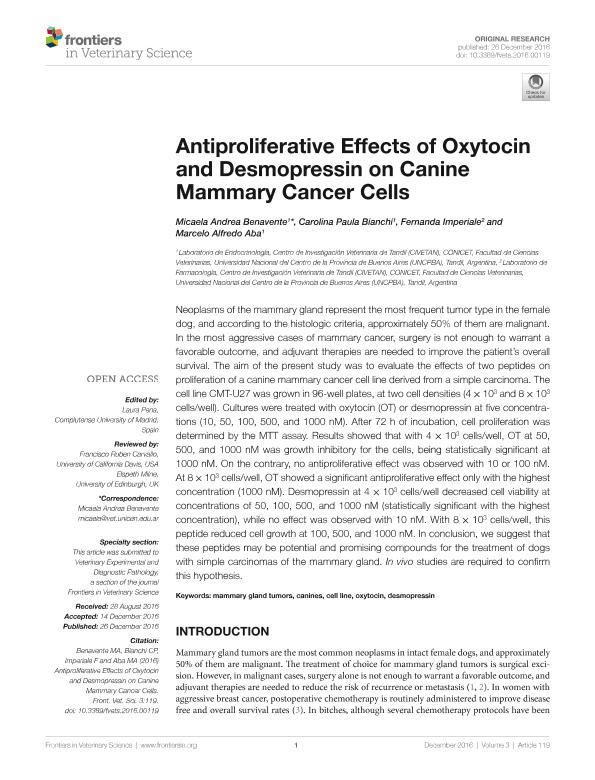Artículo
Antiproliferative effects of oxytocin and desmopressin on canine mammary cáncer cells
Benavente, Micaela Andrea ; Bianchi, Carolina Paula
; Bianchi, Carolina Paula ; Imperiale, Fernanda Andrea
; Imperiale, Fernanda Andrea ; Aba, Marcelo Alfredo
; Aba, Marcelo Alfredo
 ; Bianchi, Carolina Paula
; Bianchi, Carolina Paula ; Imperiale, Fernanda Andrea
; Imperiale, Fernanda Andrea ; Aba, Marcelo Alfredo
; Aba, Marcelo Alfredo
Fecha de publicación:
12/2016
Editorial:
Frontiers Media S.A.
Revista:
Frontiers in Veterinary Science
ISSN:
2297-1769
Idioma:
Inglés
Tipo de recurso:
Artículo publicado
Clasificación temática:
Resumen
Neoplasms of the mammary gland represent the most frequent tumor type in the femaledog, and according to the histologic criteria, approximately 50% of them are malignant.In the most aggressive cases of mammary cancer, surgery is not enough to warrant afavorable outcome, and adjuvant therapies are needed to improve the patient?s overallsurvival. The aim of the present study was to evaluate the effects of two peptides onproliferation of a canine mammary cancer cell line derived from a simple carcinoma. Thecell line CMT-U27 was grown in 96-well plates, at two cell densities (4 × 103 and 8 × 103cells/well). Cultures were treated with oxytocin (OT) or desmopressin at five concentrations(10, 50, 100, 500, and 1000 nM). After 72 h of incubation, cell proliferation wasdetermined by the MTT assay. Results showed that with 4 × 103 cells/well, OT at 50,500, and 1000 nM was growth inhibitory for the cells, being statistically significant at1000 nM. On the contrary, no antiproliferative effect was observed with 10 or 100 nM.At 8 × 103 cells/well, OT showed a significant antiproliferative effect only with the highestconcentration (1000 nM). Desmopressin at 4 × 103 cells/well decreased cell viability atconcentrations of 50, 100, 500, and 1000 nM (statistically significant with the highestconcentration), while no effect was observed with 10 nM. With 8 × 103 cells/well, thispeptide reduced cell growth at 100, 500, and 1000 nM. In conclusion, we suggest thatthese peptides may be potential and promising compounds for the treatment of dogswith simple carcinomas of the mammary gland. In vivo studies are required to confirmthis hypothesis.
Palabras clave:
MAMMARY GLAND TUMORS
,
CANINES
,
CELL LINE
,
OXYTOCIN
,
DESMOPRESSIN
Archivos asociados
Licencia
Identificadores
Colecciones
Articulos(CIVETAN)
Articulos de CENTRO DE INVESTIGACION VETERINARIA DE TANDIL
Articulos de CENTRO DE INVESTIGACION VETERINARIA DE TANDIL
Citación
Benavente, Micaela Andrea; Bianchi, Carolina Paula; Imperiale, Fernanda Andrea; Aba, Marcelo Alfredo; Antiproliferative effects of oxytocin and desmopressin on canine mammary cáncer cells; Frontiers Media S.A.; Frontiers in Veterinary Science; 3; 119; 12-2016; 1-6
Compartir
Altmétricas



